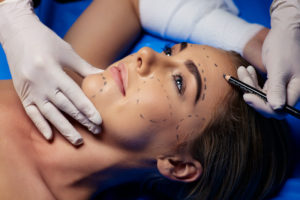Aesthetic and reconstructive surgery has become more popular over the years, but many still believe common misconceptions about plastic surgery. Learn from an expert, double board-certified plastic and reconstructive surgeon about truths and myths about cosmetic and reconstructive surgery.
Dr Dwayne Lett, a Cosmetic and Reconstructive Surgeon at The Surgical Clinic, has noticed some misconceptions people have about plastic surgery. In his practices in The Lett Center located in Mt. Juliet and Lebanon, Tennessee, Dr. Lett has treated women and men with a wide range of reasons for seeking surgery and from all walks of life. For years, people have judged aesthetic surgery as a frivolous practice. In truth, cosmetic surgery is a lot like other medical specialties with highly trained surgeons who perform vital, life-changing procedures. With so much misinformation floating around, it’s important to know the truth.
Here are Eight Common Misconceptions about Plastic Surgery:
1. It’s All About Vanity
While facelifts and breast augmentation might get the most publicity, they’re only a small part of plastic surgery practice. Many surgeons perform surgeries to fix birth defects such as cleft lips or breast reconstructions after cancer treatment. We have various procedures and surgeries that can help reach your desired outcome no matter if it is for looks or something else.
2. It’s Only for the Rich
Many insurance companies won’t cover cosmetic surgery, but that does not mean it’s only for wealthy patients. As a rule, cosmetic plastic surgery is considered “elective surgery.” With advancements in technology, procedures have become more affordable. In fact, the majority of people who get cosmetic or aesthetic surgery are middle income.
3. It’s Only for Women
Over the last 20 years, the number of men getting plastic surgery procedures has increased by 325 percent. Recent studies have shown that men believe a more youthful and pleasing appearance helps them earn promotions and be competitive in the workforce. Botox, hair transplantation/
4. It’s Very Dangerous
Every surgery has its own risks. Cosmetic and reconstructive surgery is no more dangerous than other procedures. It’s important to consult your doctor before you undergo any surgery. Find out what they are, how frequently they occur, and how they will be dealt with if they do. Seek another opinion if the doctor refuses to fully explain the hazards or admits that there are always risks. Pain tolerance varies from patient to patient following surgery. To help alleviate any discomfort, your surgeon will prescribe the right pain medications. In general, most facial cosmetic procedures result in minor post-operative discomfort. Liposuction is slightly more painful than other procedures. Procedures that require muscle elevation or tightening, such as abdominoplasty or breast augmentation, can be as painful as a C-section.
5. Plastic Surgery is the Same as Cosmetic Surgery
“Plastic surgery” and “cosmetic surgery” are not the same thing. Due to a misunderstanding, the public has misconceptions regarding the two specialties. Cosmetic surgery is surgery to improve one’s appearance. It is an elective course that focuses on beauty aesthetics. Cosmetic surgery refers to procedures that improve a person’s appearance. On the other hand, plastic surgery encompasses both cosmetic procedures and reconstructive surgeries; such as burn treatments and correcting birth defects. Also, the training for plastic surgeons is much more rigorous than for cosmetic surgeons. Plastic surgeons have to go through years of extensive training in order to become board certified. We even have specifically separate centers and clinics for cosmetic surgery.
6. The Doctor Will Talk Me Into Surgery
Our doctors will not talk you into a procedure that you do not want or are not ready for. It is vital to get all your questions and concerns on the table. You’ll share your medical history, describe any medications you’re taking, and discuss your objectives and expectations with the surgeon while he evaluates the region of your body you want to be treated.
During your initial consultation, ask the surgeon the following questions:
- Am I a good candidate for this procedure? Why or why not?
- How many times have you done this procedure? What were the results?
- Are there treatments other than surgery that might work just as well or better for me?
- Can the desired effect be accomplished in one procedure, or do you anticipate multiple procedures?
- Can you share before and after photos or diagrams to help me understand the procedure and the expected results?
- What are the surgical options? What are the pros and cons for each?
- Will the results be permanent?
- What type of anesthetic will be used?
- How will this procedure affect me?
- Will I be hospitalized? If so, for how long?
- What are the possible complications?
- How will my progress be monitored after surgery? What follow-up care will I need? How long of a recovery period can I expect?
- How much will the procedure cost?
The more you work with your surgeon before surgery to develop specific, quantifiable, and achievable goals, the more likely you will be pleased with the results.
7. You Do Not Know How to Set Your Expectations
In the social media world we live in, we see botox and other procedures so often. We also see those procedures with filters and photoshop. Use professional models and photographs as a resource and not an expectation. Expect progress rather than perfection. You’ll be disappointed if you expect cosmetic surgery to make you into a movie star. Don’t expect surgery to salvage your marriage, get you a promotion, or boost your social life. Talk to your surgeon about realistic expectations and let him/her show you their results.
8. You Won’t Have Scars
Don’t be fooled by claims that plastic surgeons conduct “scarless” procedures. Plastic surgeons are skilled at concealing or camouflaging scars, and they take pride in the quality of their incision closures. This is frequently used by patients to determine whether or not a procedure was successful. Don’t be hesitant to inquire about them.

Plastic Surgery in Lebanon, Tennessee
If you’ve been wondering if cosmetic surgery is right for you, call The Lett Center today at 615-443-0901. Dr. Lett has an aesthetic and reconstructive surgery practice devoted to rejuvenating and enhancing your natural beauty using state-of-the-art procedures that will result in beautiful, natural results that make you look better and feel more confident. To learn more about Plastic and Reconstructive Surgery and other services visit The Surgical Clinic.




